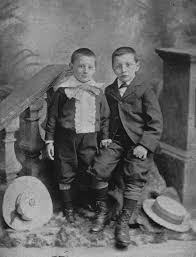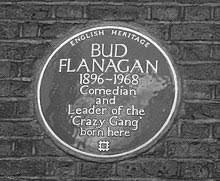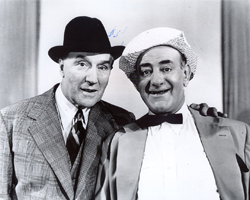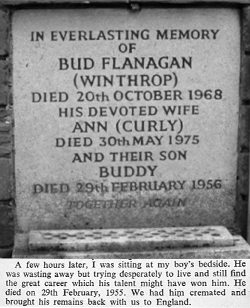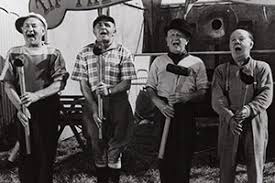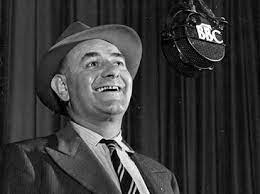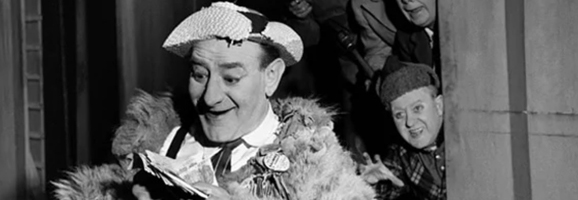
As the familiar refrain of what was to effectively become their ‘theme tune’ began, the dapper gentleman in the double breasted suit and trilby hat followed his partner to the cart. Chesney Allen put his hands on the shoulder of Bud Flanagan, dressed in his signature moth eaten beaver coat and crownless, broken brimmed straw boater, and the two began to sing ‘Underneath the Arches’…
Bud Flanagan’s parents, Wolf and Yetta (Kitty) Weintrop were Polish Jews who were married in the city of Radom, Poland, and fled the country on the day of their wedding to avoid a pogrom – ethnic cleansing that was sweeping the country at the time. They had intended to flee to America and had in fact paid for a ticket to New York, but an unscrupulous agent gave them a ticket to London, instead. Settling in Whitechapel, Wolf opened a Barbers Shop and Tobacconists to support his growing family of ten children, and Bud Flanagan was born at 12, Hanbury Street, Whitechapel, in the East End of London on the 14th October 1896, and named Chaim Rueben Weintrop.
Young Chaim had got a taste for performing, and realised that at Saturday matinees, the Music Hall had a period where the acts worked for nothing. He had already developed a few magic tricks and was good at sleight of hand work, so one afternoon; he turned up, announced himself as ‘Fargo’ – the Boy Wizard, and went on stage. His first show was a disaster, and he was hauled away by his father, getting a thick ear for working on the Sabbath!
He went to school in Petticoat Lane, a short distance away, but by the time he was just 10 years old, he had found himself a job as a runner or ‘call boy’ at the Cambridge Music Hall in Commercial Street, just around the corner. He quickly cottoned on that the acts in the Music Hall liked a bit of Fish and Chips at the end of the show, so Bud would nip back to his father’s shop and return laden with food. He admits that he received no wages, but the tips he collected for his ‘errands’ made up for it…
In 1910, aged 14, undeterred and full of a sense of adventure, he left home and walked all the way from London to Southampton where he lied about his age (he said he was aged 17), claimed he was an electrician and blagged his way on board the SS Majestic , bound for New York with a friend. As soon as they arrived in the United States, they immediately jumped ship, dressed as stewards! They tracked down the friend’s cousin, who welcomed them and allowed them to stay.
Needing work, he got various menial jobs selling newspapers, delivering telegrams for Western Union, and harvesting wheat in Fargo, North Dakota. He longed to become a performer and joined a vaudeville show that toured across the US. He admits that he couldn’t save a bean on his paltry wages but that money just couldn’t buy the valuable experience he was getting. By October 1914, aged just 18, he sailed with a show to perform in New Zealand and Australia, and then travelled to perform on stage in South Africa, where he met his brother Alec, who was living there at the time.
By the time he returned to San Francisco, the rumblings of War had started over Europe, and he decided to return to the United Kingdom to enlist to fight for Britain. He arrived in 1915 and enlisted as “Robert” Weintrop; joined the Royal Field Artillery, and was sent with his unit to fight in France.
In the Army, he worked as a driver but also entertained the troops with his singing and impersonations. It was during his time in the Army that he met the anti-Semitic Sergeant-Major Flanagan, on whom Reuben later had his revenge when he adopted the name “Flanagan” as his stage name. (Once, arrested by the NCO when he was just a Sergeant, he was accused of ‘swearing at him with his eyes’. Unable to contain himself, Weintrop burst out laughing, and the Commanding Officer rapidly dismissed the charges).
After the war ended, (and having been temporarily blinded in a gas attack) he returned back to Britain and on 19th February 1919 he was demobbed.
One day, walking across Piccadilly Circus, he bumped into a soldier he had met in Poperighe in the West Flanders region of Belgium, a year or two before. This dapper looking former actor was called Chesney Allen. Together, they decided to form a comedy double act, Flanagan and Roy, with (now) Flanagan reprising a ‘black faced’ act he had perfected in the States, but it wasn’t until 1926, while touring with a Florrie Forde show called “Here’s to You”, that they established a reputation and were eventually booked by Val Parnell for a spot at the Holborn Empire.
During the previous year (1925) Bud had married Ann Quinn (who he called ‘Curly’) who was the daughter of Irish comedian Johnny Quinn. Tragically, although their son Buddy was born in 1926, he was to die of Leukaemia in Los Angeles on 29th February 1955 with Bud by his bedside. He was cremated and brought back to England. Most sources state Buddy died in 1956 – indeed, that is what is written on the gravestone – (see right) – but the date differs from that in Bud’s own 1961 autobiography ‘My Crazy Life’…
Throughout their career, Flanagan and Allen became renowned for gentle, humorous songs, which often reflected the experiences of ordinary folk during the War, such as ‘Underneath the Arches’ (which effectively became their signature theme tune), ‘Dreaming’, ‘Run, Rabbit’, ‘Down Forget-Me-Not Lane’ and ‘Any Umbrellas’. Bud Flanagan had a reasonable singing voice and could hold a melody while Chesney Allen used a more ‘spoken’ style which complimented the harmonies.
Both Flanagan and Allen were members of The Crazy Gang, a revue group consisting of six (occasionally seven) performers – Jimmy Nervo, Teddy Knox, Charlie Naughton and Jimmy Gold with ‘Monsewer’ Eddie Gray joining them on occasions. They appeared in the first show at the London Palladium in 1931, and the pair continued to work with the revue group, concurrently with their double-act career.
As the Second World War ended, Chesney Allen decided to retire and became a Theatrical Agent, but Bud Flanagan worked on. In 1951, he was elected as King Rat in the Grand Order of Water Rats, a charity originally started in 1889 by Joe Elvin and Jack Lotto to raise money to ‘assist members of the Theatrical Profession, or their dependants, who, due to illness or old age are in need’. Additional funds go to such causes as hospitals, health charities and benevolent funds. The Water Rats had the honour of making Queen Elizabeth’s husband, The Duke of Edinburgh a Companion of the Order at a special luncheon. Spurred on by an idea suggested to him by his wife Curly, Bud approached the Duke with the Order’s tiny gold badge, gripped the Duke’s lapel and announce to the assembled guests. ‘That’s a smashing bit of material’!
In 1959, in recognition of his services to the entertainment industry, Bud was awarded the Officer of the Most Excellent Order of the British Empire Medal – the OBE
In 1968, Bud Flanagan’s final recording was to be Jimmy Perry and Derek Taverner’s familiar theme tune for the British sitcom Dad’s Army. Bud supposedly recorded “Who Do You Think You Are Kidding, Mr Hitler?” in one take, at the Riverside Studios in London and was paid the princely sum of a Hundred Guineas (£105) for his trouble…
Sadly, a few months after recording the theme tune, Bud was to die of a heart attack on October 20th 1968, aged 72, and he was cremated at the Golders Green Crematorium. He was so popular, it is said that over 100,000 people lined the streets to view his funeral procession.
Following his death, Bud’s will instructed executors to set up the ‘Bud Flanagan Leukaemia Fund’ for further research into the disease that had taken his son, and the Royal Marsden Hospital in Sutton, Surrey now has a ‘Bud Flanagan Leukaemia Ward’ and has become one of the leading treatment centres for this illness…

